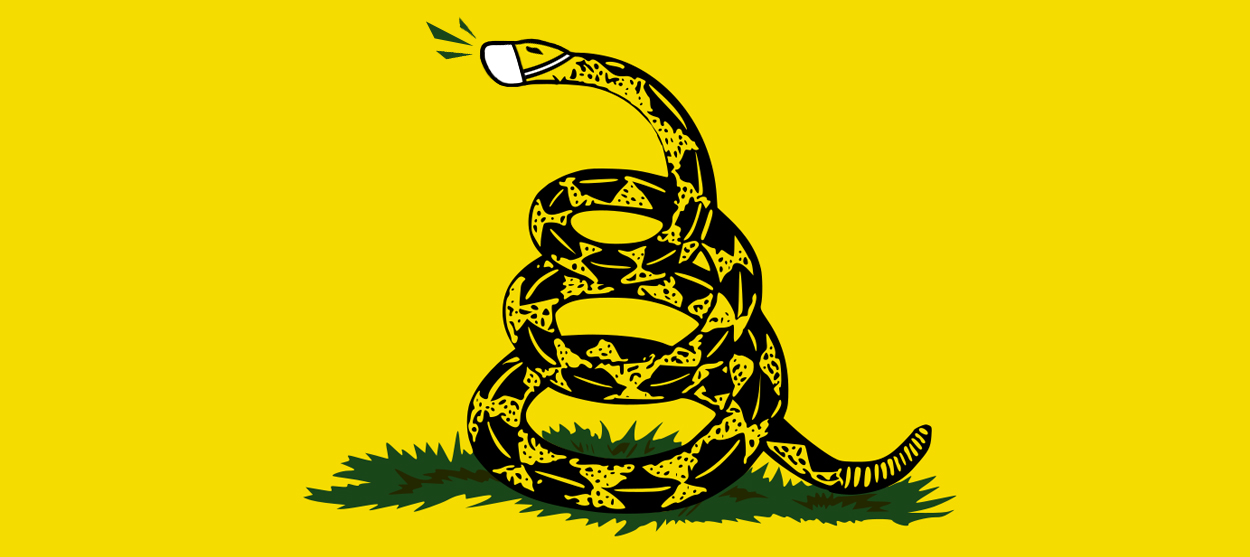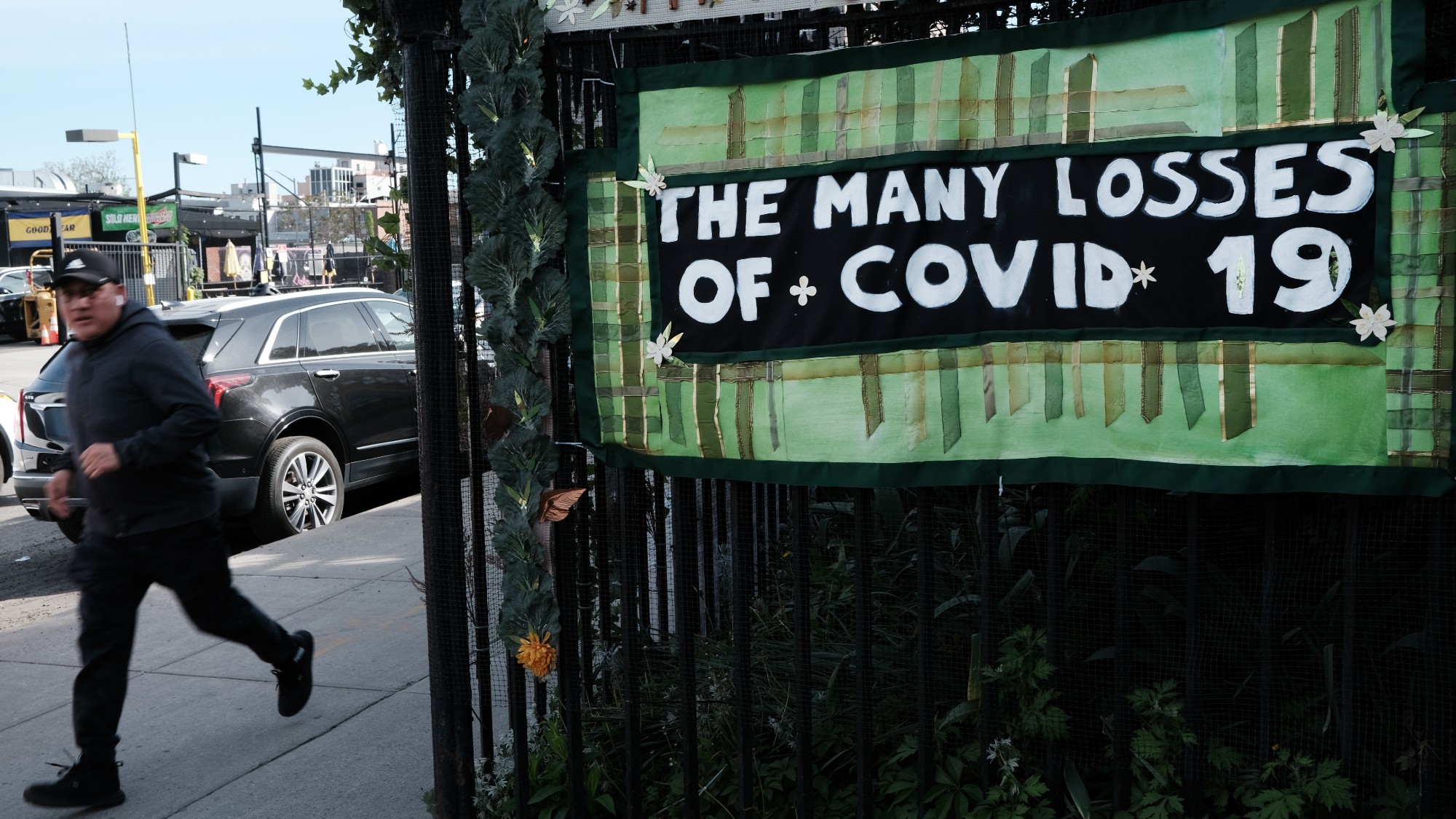What libertarians would do in response to coronavirus
There are no atheists in foxholes, so the saying goes. But what about libertarians in a pandemic?


A free daily email with the biggest news stories of the day – and the best features from TheWeek.com
You are now subscribed
Your newsletter sign-up was successful
There are no atheists in foxholes, so the saying goes. But what about libertarians in a pandemic?
The rumors of our fear-induced inconsistency are much exaggerated, and, contrary to a bizarrely-argued "no libertarians in an epidemic" piece at The Atlantic, President Trump's irresponsible glibness and hypocritical scaremongering about "socialism" cannot be laid at libertarianism's feet.
Still, there is a legitimate question here: How would libertarians handle a pandemic? Does our usual opposition to state involvement in health care go out the window?
The Week
Escape your echo chamber. Get the facts behind the news, plus analysis from multiple perspectives.

Sign up for The Week's Free Newsletters
From our morning news briefing to a weekly Good News Newsletter, get the best of The Week delivered directly to your inbox.
From our morning news briefing to a weekly Good News Newsletter, get the best of The Week delivered directly to your inbox.
The novel coronavirus is a novel situation for modern libertarianism: While there have been unusual disease outbreaks in the recent past — Ebola, swine flu, SARS — COVID-19 is forecast to be a unique situation in the last century. Realistically, there won't be a single libertarian view on the state's role in a pandemic. What we call "libertarianism" is a big tent with significant division on issues including immigration, abortion, and whether the state should exist at all. (There are anarchists in the tent.)
Nevertheless, pandemic-era libertarianism is emerging, and it remains distinctly libertarian. Here are the trends I'm seeing.
1. Praise for the free market's role in keeping day-to-day life functional. "That gallon jug of hand sanitizer delivered to your front door less than 48 hours after you ordered it online? It didn't show up because Trump tweeted it into existence or because the surgeon general is driving a delivery truck around the country," Reason's Eric Boehm wrote in a rebuttal of the Atlantic story. Libertarian author Jeffrey Tucker likewise explained how in "a disease panic, the market is your friend," and some libertarians have proposed tariff relief as a response to the pandemic's economic damage.
2. Advice of personal responsibility. Rep. Justin Amash (I-Mich.) has encouraged voluntary social distancing. Reason's coverage has done the same, emphasizing the seriousness of the illness and offering tips for continuing education at home while school is canceled. A piece at the Libertarian Institute promoted conservative personal finance decisions to limit COVID-19's disruption.
A free daily email with the biggest news stories of the day – and the best features from TheWeek.com
3. Condemnation of counterproductive regulations and lack of transparency. Why is the United States so far behind other countries in testing for coronavirus cases? For weeks, the FDA and CDC wouldn't let medical workers and academics move forward with COVID-19 tests they'd developed without lengthy processes of federal approval. In fact, these agencies actively discouraged independent testing until the end of February while offering a faulty test kit and too-strict guidelines for who could be tested. Certificate of need laws, promoted as a way to prevent redundancy in the health-care system, have also come under libertarian fire for artificially reducing health-care facilities that could have treated COVID-19 patients.
While the testing situation is beginning to improve, the Trump administration has classified its coronavirus meetings, an anti-transparency move libertarians have warned will slow response time. Amash complained lawmakers weren't given enough time to read last week's coronavirus relief bill before it passed, and the Foundation for Economic Education slammed Beijing for repressing the message of heroic coronavirus whistleblower Dr. Li Wenliang.
4. Rejection of corporate bailouts and price controls. Trump is exploring plans for corporate bailout loans and other economic stimuli which libertarians generally oppose. The Cato Institute has argued against "big bailouts and ... throwing money at businesses that will not be viable in the new post‐epidemic world" while allowing for measures to "mitigate the distress that is coming," especially for people who can't continue working. Trump's idea of a payroll tax cut isn't winning libertarian support, as it would add to federal debt, do nothing for people who can't work, and encourage shopping, which is the opposite of social distancing.
The libertarian take on targeted tax breaks like Trump wants for energy and travel-related industries will be more mixed: We disagree on whether tax cuts like this should be opposed as favoritism amounting to corporate welfare or supported because any tax break is a good thing. Not mixed is the opposition to price controls, as higher prices are a useful signal of growing demand that discourages hoarding and encourages increased production.
5. Mixed feelings on emergency social welfare. Libertarians have a reputation for universal opposition to all social safety net spending, and many do take that position. But perhaps the most famous libertarian economist — Nobel Prize winner F.A. Hayek — supported a limited welfare state, including a universal basic income. This fault line will extend into libertarian stances on pandemic responses like state-provided testing, treatment, and income subsidies. (In my experience, most thoughtful libertarians get less worked up about real needs being filled in a way we consider non-ideal than about more egregious state overreaches like unjust wars or police violence.)
Relatedly, libertarians have not, as alleged, "hollow[ed] out the civil service." For one thing, we are historically very bad at acquiring political power. For another, the Trump administration attempted to cut the CDC budget, but thanks to Congress, it has consistently risen instead.
6. Skepticism of mandatory lockdowns, travel bans, and the like. This is the big one. Some libertarians have categorically rejected forced quarantines, arguing the risk of infection is not a direct enough threat to justify impeding people's rights. Most have not taken that view, instead expressing skepticism of the effectiveness of broad quarantines and travel bans — a skepticism public health experts share, by the way — while conceding there could be circumstances where these measures are appropriate for a time. The legal uncertainty around state and federal powers to require quarantines and limit public gatherings has libertarians predictably worried about due process rights.
7. Insistence on temporary changes. Fierce opposition to expansions of the surveillance state to fight the novel coronavirus is likely widespread among libertarians in no small part because privacy rights, once lost, are very rarely recovered. But the risk of this pandemic permanently expanding the power of the state will shape the libertarian view on every proposed solution. "I think it's perfectly legitimate for libertarians to support a temporary expansion of government in response to ... truly extreme events," Boehm told me in a conversation on Twitter. But "TEMPORARY [is] the key/problematic term there."
For many libertarians, our worries about robust government responses to COVID-19 are less about the responses proper than the possibility that the changes they bring will never end, even after the disease is under control. There are libertarians in a pandemic, and we're as preoccupied by coronavirus as everyone else. We're just preoccupied by liberty, too.
Want more essential commentary and analysis like this delivered straight to your inbox? Sign up for The Week's "Today's best articles" newsletter here.
Bonnie Kristian was a deputy editor and acting editor-in-chief of TheWeek.com. She is a columnist at Christianity Today and author of Untrustworthy: The Knowledge Crisis Breaking Our Brains, Polluting Our Politics, and Corrupting Christian Community (forthcoming 2022) and A Flexible Faith: Rethinking What It Means to Follow Jesus Today (2018). Her writing has also appeared at Time Magazine, CNN, USA Today, Newsweek, the Los Angeles Times, and The American Conservative, among other outlets.
-
 Political cartoons for February 15
Political cartoons for February 15Cartoons Sunday's political cartoons include political ventriloquism, Europe in the middle, and more
-
 The broken water companies failing England and Wales
The broken water companies failing England and WalesExplainer With rising bills, deteriorating river health and a lack of investment, regulators face an uphill battle to stabilise the industry
-
 A thrilling foodie city in northern Japan
A thrilling foodie city in northern JapanThe Week Recommends The food scene here is ‘unspoilt’ and ‘fun’
-
 The billionaires’ wealth tax: a catastrophe for California?
The billionaires’ wealth tax: a catastrophe for California?Talking Point Peter Thiel and Larry Page preparing to change state residency
-
 Bari Weiss’ ‘60 Minutes’ scandal is about more than one report
Bari Weiss’ ‘60 Minutes’ scandal is about more than one reportIN THE SPOTLIGHT By blocking an approved segment on a controversial prison holding US deportees in El Salvador, the editor-in-chief of CBS News has become the main story
-
 Has Zohran Mamdani shown the Democrats how to win again?
Has Zohran Mamdani shown the Democrats how to win again?Today’s Big Question New York City mayoral election touted as victory for left-wing populists but moderate centrist wins elsewhere present more complex path for Democratic Party
-
 Millions turn out for anti-Trump ‘No Kings’ rallies
Millions turn out for anti-Trump ‘No Kings’ ralliesSpeed Read An estimated 7 million people participated, 2 million more than at the first ‘No Kings’ protest in June
-
 Ghislaine Maxwell: angling for a Trump pardon
Ghislaine Maxwell: angling for a Trump pardonTalking Point Convicted sex trafficker's testimony could shed new light on president's links to Jeffrey Epstein
-
 The last words and final moments of 40 presidents
The last words and final moments of 40 presidentsThe Explainer Some are eloquent quotes worthy of the holders of the highest office in the nation, and others... aren't
-
 The JFK files: the truth at last?
The JFK files: the truth at last?In The Spotlight More than 64,000 previously classified documents relating the 1963 assassination of John F. Kennedy have been released by the Trump administration
-
 'There is a certain kind of strength in refusing to concede error'
'There is a certain kind of strength in refusing to concede error'instant opinion 'Opinion, comment and editorials of the day'
